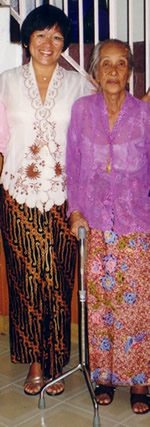
Peranakans

Josephine with her mother, whom she calls Mak
My heritage is worth mentioning as Peranakans are a minority group. A Peranakan Museum recently opened in Singapore in the 21st Century which seems to suggest the importance of validating a culture that nearly disappeared. I’m amused to think that I’m like an historical artefact, my culture and heritage, ie parts of me, dated and chronicled in a museum whilst I’m still living!
Sociologists might give you an opinion of how Peranakans came about but I prefer the folk-lore version based on the Malay Annals or Sejarah Melayu. The story goes that sometime in the 13th Century, the Emperor of China wanted to control trade in Asia. He realised that the Straits of Malacca was a significant shipping route between the East and West. He felt that a marriage between his daughter and the Sultan of Malacca would benefit his Kingdom. So he sent his daughter Princess Hang Li Po to marry the Malay Sultan Mansur Shah. The Princess went with a retinue of servants, courtiers and merchants. From that marriage and marriage of the Chinese men with local Malay maidens, the Peranakan race was born.
The word Peranakan comes from the Malay word, anak, child; its prefix and suffix indicating a creation of something new. Peranakans keep their Chinese name and religion, either Taoism or Buddhism. Mostly from Fujian, China, they assimilated the Malay language into their own Hokkien dialect, creating a patois language. The Malay sarong kebaya was adopted as a costume for their women. Like the language, the cuisine became a wonderful blend of the two cultures. Spices were added liberally to bland Chinese food to improve its flavour. The cuisine came to be called Nonya Cusine; nonya being a female Peranakan. Men are called Baba, that’s why Peranakans are informally called Baba dan (and) Nonya.
Peranakans settled first in Malacca, then Penang, later Singapore. The three places were called The Straits Settlements by The British. To differentiate the Peranakan Chinese from immigrant Overseas Chinese who adhered to their own customs without assimilating local culture, Peranakans were called Straits Chinese.
Peranakans are an endangered species, so many marrying traditional Chinese who have little understanding or sympathy for its uniqueness and richness. Like all endangered species, the culture needs protection and preservation. The True-Blue Elders are fast disappearing and the young need to harvest as much knowledge from them as possible and capture their wisdom and customs before it’s too late.

For me, yoga is a living practice, every single hour, every single day in my ordinary everyday life.
View more...

View Photos and look up upcoming events here

Listen to podcasts & interviews here
